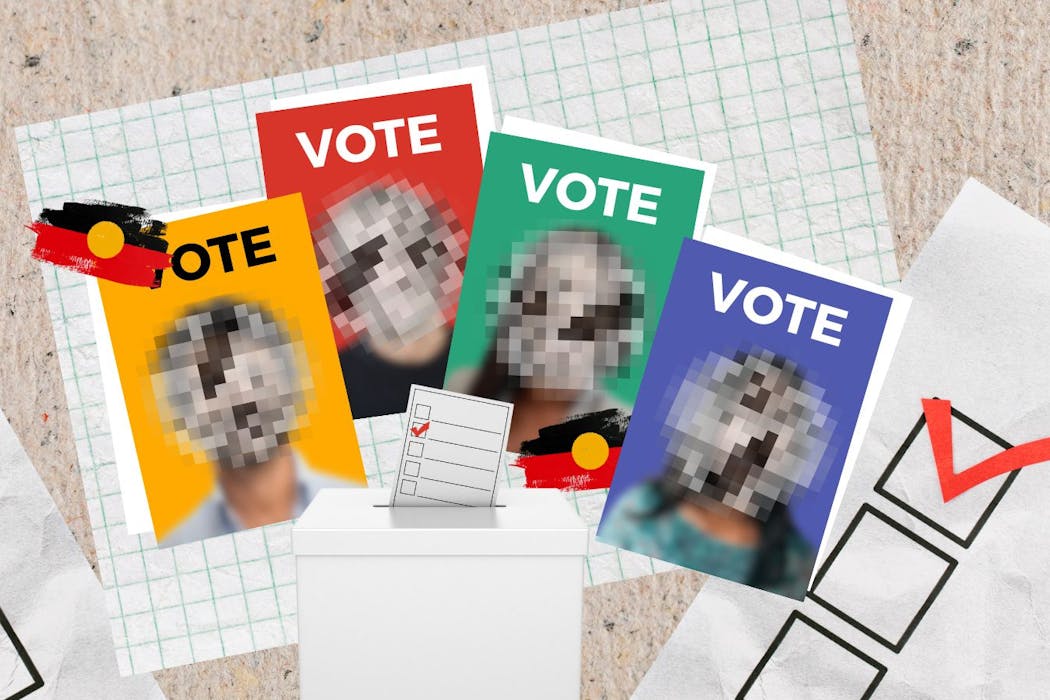
When political parties consider potential Indigenous candidates, they often worry about voter backlash.
It’s a concern rooted in Australia’s troubling history of racism and the ongoing discrimination Indigenous people face in everyday life.
But what if party selectors are wrong about voters?
Our new research reveals something surprising: when Australians evaluate potential Indigenous candidates for parliament, their Indigenous background doesn’t count against them.
In fact, they rate Indigenous candidates more positively than candidates of other backgrounds.
This finding challenges long-held assumptions about voter prejudice. It also has important implications for increasing Indigenous representation in Australian parliaments.
How we tested voter attitudes
To understand how Australians really view potential Indigenous candidates, we surveyed 4,000 Australian adults across the nation.
Each respondent was randomly shown a professional photograph and biography of a person hoping to run for their preferred political party in their local electorate.
While each survey respondent saw only one candidate, we created eight variations: men and women, a white Australian, Chinese Australian, light-skinned Indigenous Australian and dark-skinned Indigenous Australian.
Apart from these differences in race, gender and skin tone, all the candidates presented identical biographies: each was a doctor, active in their communities, married with children and motivated to enter politics to give locals greater say in decisions affecting them.
Respondents rated their assigned candidate on competence and warmth.
An inverted hierarchy
Based on decades of research that show racial hierarchies in public attitudes, we expected Indigenous candidates to fare worst, followed by Chinese Australian candidates, with white candidates rated most favourably.
We also anticipated darker-skinned Indigenous candidates would be rated more harshly than lighter-skinned ones, reflecting Australia’s history of colourism.
We were wrong on all counts.
Dark-skinned Indigenous candidates scored highest on both competence and warmth.
By contrast, white male candidates fared worst in perceptions of competence – a striking result given the disproportionately high presence of white men in Australian legislatures.
Chinese Australian candidates fell somewhere in the middle.
Against expectations
How do we explain these unexpected findings?
One possibility is what psychologists call a “positive violation of expectations”.
When people encounter someone who defies negative social stereotypes – in this case, an Indigenous doctor who is seeking political office – they may rate them more favourably than an equally qualified person from a group with more positive stereotypes.
What we found could reflect two very different underlying attitudes.
It might represent a genuine recognition that Indigenous candidates have overcome significant systemic barriers – essentially, voters acknowledging and “rewarding” that achievement.
Or it may reflect underlying racist stereotypes: if someone has low initial expectations, an accomplished Indigenous candidate may seem exceptional rather than simply qualified.
The importance of political ideology
There’s an important moderator in our findings: political ideology matters.
The further to the right on the political spectrum the respondents were, the more their ratings of Indigenous candidates declined relative to white candidates.
Among left-leaning voters, Indigenous candidates held substantial advantages in both competence and warmth. Among right-leaning voters, these advantages diminished considerably.
This divide suggests Indigenous candidates may face different receptions depending on the political lean of an electorate.
At the same time, even among respondents who consider themselves around the centre, dark-skinned Indigenous candidates were still rated most favourably.
What this means for political parties
Our findings have direct implications for party gatekeepers who try to identify potential candidates.
These people often engage in what political scientists call “strategic discrimination” – avoiding minority candidates because they fear voter backlash, regardless of whether that fear is justified.
The assumption that Indigenous candidates will struggle with voters, particularly in majority-white electorates, may be keeping qualified Indigenous people out of parliament.
Our research suggests these fears are misplaced, at least for highly qualified Indigenous candidates.
The caveats
While potentially good news for Indigenous Australians thinking about a career in politics, our study focused specifically on potential candidates with high-status professional backgrounds.
We cannot assume the same positive evaluations would apply to Indigenous candidates from all walks of life.
We also studied potential candidates at the earliest stage of political ambition, rather than those who have already secured party endorsement.
And while our findings challenge assumptions about voter bias, they don’t eliminate other barriers to Indigenous representation. These include systemic racism within party structures, lack of networks and resources and the personal toll of campaigning while facing discrimination.
A path forward
Ours was the first study anywhere in the world to examine how voters evaluate potential Indigenous candidates at a national level.
Extending this research to other settler democracies such as Canada, New Zealand and the United States would reveal whether our findings represent a broader pattern – one that could reshape how parties approach First Nations candidate recruitment globally.
What’s clear from our research is that Australian political parties shouldn’t assume Indigenous candidates will face voter rejection. The practical implication remains: Indigenous candidates can resonate with voters.
If we want more representative parliaments that reflect Australia’s full diversity, we need to challenge assumptions about what voters will accept.
This article is republished from The Conversation, a nonprofit, independent news organization bringing you facts and trustworthy analysis to help you make sense of our complex world. It was written by: Josh Holloway, Flinders University; Duncan McDonnell, Griffith University, and Michelle Evans, The University of Melbourne
Read more:
- View from The Hill: Ley’s in a no-win situation as warring Liberal tribes battle over net zero
- As Australia welcomes its millionth refugee, its hardline border policies endure. We can lead by example again
- How did the 10 prime ministers since Whitlam change Australia?
Josh Holloway receives funding from the Australian Research Council.
Duncan McDonnell receives funding from the Australian Research Council.
Michelle Evans receives funding from the Australian Research Council.


 The Conversation
The Conversation
 Reason
Reason Mediaite
Mediaite Raw Story
Raw Story 1819 News
1819 News The Miami Times
The Miami Times The Oregonian Public Safety
The Oregonian Public Safety FOX News
FOX News AlterNet
AlterNet